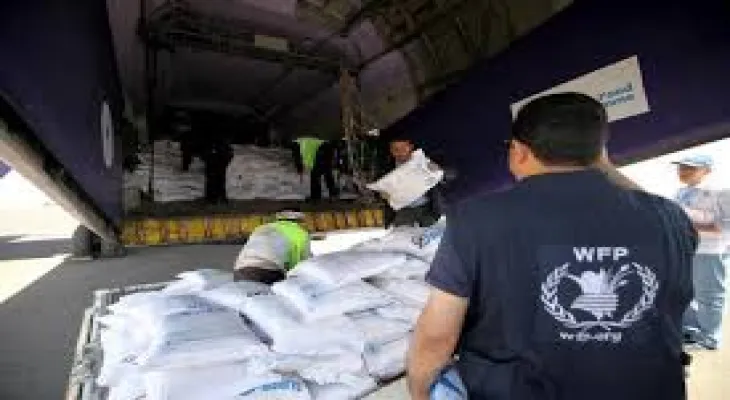Search here
Newspaper
Search here

Arab Canada News
News

Published: March 5, 2024
The media advisor of the UNRWA agency, Adnan Abu Hasna, confirmed that there is an unprecedented collapse of humanitarian conditions in the Gaza Strip, and that aerial drops will not be a substitute for land routes, pointing out that he expects the ongoing tragedy in Gaza to worsen during the blessed month of Ramadan, reiterating the United Nations' request for an immediate ceasefire for humanitarian reasons and allowing relief agencies to access the northern part of the Strip.
According to the United Nations Media Center, the UNRWA official confirmed that air-dropping aid cannot replace the entry of trucks into Gaza by land, and that they do not coordinate with the agency. He reminded that there are 7 border crossings to the Strip, and emphasized that if the political will to open them is found, UNRWA will be able to face the "major humanitarian disaster that threatens all the residents of the Gaza Strip."
Adnan Abu Hasna confirmed that the financial situation of UNRWA is still critical to this moment, and that funding is not sufficient even until the end of the current March, and that the donations provided by the European Union are very important donations, and that countries like Ireland, for example, have provided about twenty million euros.
He said: We hope that there will be more donations so that we can continue providing services to Palestinian refugees, to continue our operations not only in Gaza, but also in Lebanon, Syria, Jordan, and the West Bank including East Jerusalem. The donation provided by the European Union will help somewhat, but the crisis remains deep. There are 16 countries that were supposed to pay 450 million dollars. These countries provided about 70 percent of UNRWA's budget last year. Therefore, if these grants or financial contributions are not renewed, the situation will be very dangerous for all UNRWA operational areas and not only Gaza.
The President of the United Nations General Assembly, Dennis Francis, also confirmed that the situation in Gaza is "catastrophic, unacceptable, and shameful," expressing "shock and horror" over the killing and injuring of hundreds of people during this worst month for food supplies, west of Gaza City, last week.
According to the United Nations Media Center, "Francis" expressed deep concern over the intensive Israeli air raids on Rafah, south of the Strip, including residential areas, echoing what the UN Coordinator for Emergency Relief, Martin Griffiths, said, that any ground operation in such a densely populated area would leave the already fragile humanitarian operation "on the brink of death."
He renewed the call for the immediate implementation of a ceasefire for humanitarian reasons, stopping the bombing now, and compliance by all parties with their obligations under international human rights law and international humanitarian law, especially concerning the protection of civilians and civilian facilities, the immediate and unconditional release of all hostages, ensuring full and unhindered access to humanitarian aid for those in need, and called for exercising maximum restraint to save the lives of innocent civilians.
The President of the General Assembly said that after 150 days of violence, destruction, despair, and depriving people of their humanity, every day, "this painful reality continues to instill a sense of frustration and disappointment, especially among those caught in the crossfire and who look to the United Nations as a guarantor of good."
He called for work—with determination and urgency—to make greater efforts to end this conflict immediately and lay the foundations for a future in which Israel and the State of Palestine can coexist in peace.
For his part, the Commissioner-General of the United Nations Relief and Works Agency for Palestine Refugees (UNRWA), Philippe Lazzarini, warned of the serious situation in the Gaza Strip, confirming that 5% of Gaza’s population has either been killed, injured, or gone missing.
During a meeting held by the United Nations General Assembly on the work of UNRWA, the Commissioner-General said that the suffering of the population is impossible to adequately describe as doctors are forced to amputate children’s limbs without anesthesia, hunger spreads everywhere, and starvation, which is man-made, looms on the horizon.
Lazzarini pointed to the killing of more than 100 people a few days ago while they desperately sought food, while children only a few months old are dying due to malnutrition and dehydration.
He said: It chills me when I think of the horrors that will be revealed that occurred in this narrow strip of land. What is the fate of about 300,000 people isolated in the north who have been cut off from humanitarian supplies? How many people are still under the rubble throughout the Gaza Strip? What will happen to about 17,000 children who have become orphans, abandoned in a place where danger and lawlessness are increasing?
Lazzarini added: The attack on Rafah, where about 1.4 million displaced persons concentrate, is imminent, and he confirmed that there is no safe place ahead where they can go. Despite all the horrors experienced by the people of Gaza, the worst may not have come yet.
He pointed out that the International Court of Justice issued on January 26 a legally binding order including provisional measures relating to Palestinians in Gaza, which includes demanding Israel to take all measures it can to prevent acts that fall within the scope of Article Two of the Convention on the Prevention of Genocide, and enabling the provision of urgently needed essential services and assistance.
Lazzarini said: The dismantling of UNRWA in the short term will undermine United Nations efforts to address the humanitarian crisis in Gaza, exacerbate the crisis in the West Bank, deprive more than half a million children of education, and deepen resentment and despair.
Amid challenges that have brought UNRWA to the brink of collapse, the Commissioner-General stressed the necessity of resolving the financial crisis facing the agency so that it can continue its life-saving operations.
Comments